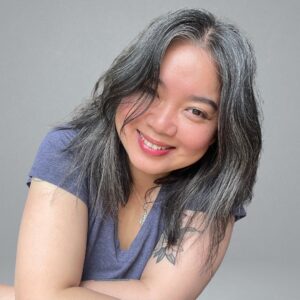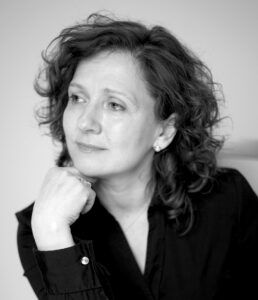Emotional truths
We Follow the River
by Onjana Yawnghwe
Qualicum Beach: Caitlin Press, 2024
$20.00 / 9781773861388
Reviewed by Daniela Elza
*

In a recent interview with Rob Taylor, Onjana Yawnghwe says: “when it came to my father’s death, I wanted to forget, but with my mother’s recent death, I wanted to remember.”
And remember Yawnghwe does. In her third book (including The Small Way) she tells her story regardless of what it would take to cross borders and languages.
We Follow the River begins with “memories are not enough for words to hold onto.” These words are in a language other than her mother tongue; her parents forbade her to speak Thai or Shan. English is “a concrete building”; she sees herself reflected in its glass windows. Two pages later, “Crossings” begins, “Between us / words / rocks.” How to carry the story of parents who left everything to come to Canada to make a better home? These words are heavy, they are burdens. Some words stick in the throat, are rarely if ever spoken.
The death of Yawnghwe’s mother acted as a catalyst for work she began writing twenty years ago. As she herself states, the collection “is an inquiry on (not) belonging, race, culture, and family trauma.” The family escaped from the violence in Myanmar, lived in exile in Thailand, and later immigrated to Canada. This inquiry overtime turns into a love story about her family.
Memories need telling. But this constant crossing is “too much for the thin walls of home.” Perhaps the place for them is in poetry, where she can capture their light. In “My Mother’s Hands” Yawnghwe asks:
who to understand
her orange light.
Who to carry her life
and take it gently from
her spotted hands.
Memory is not perfect. The story or these memories could change from a scar on her dad’s chest caused by a bullet to a scar from a heart operation (in “Scar”). The story still speaks a truth: the bullet was meant for her dad, but killed his friend instead. In her dad’s version of the story, the bullet finds its target; the loss of a friend, who takes a bullet for you, is a scar one must carry. In her mother’s version the scar was from heart surgery.

The tastes and smells of shared food cross borders without any trouble; a kind of coming home. Her mother’s cooking, the taste of sour mango, map onto landscapes and people. In “Her, Cooking” pungent soybean—“a mouth-watering goddess emerges in full orange batiks / swinging her hips like a word on a Bangkok street” —and in “Green Mango” the author hunts through market stalls in Vancouver for the true smell of green mango: “all you know of this place / all you know of where you come from… / distilled in a sharp firm slice of green.”
Yawnghwe remembers her time growing up in Vancouver, she remembers going back to Thailand, she even takes us to Italy. In “Thai Suites,” she does not feel she belongs in Thailand. She reminds us of the fate of those who have been away for too long. How she misses the home she grew up in—
(I thirst for English here),
I miss the cold
I miss the evergreens
I miss having four walls that know me.
It’s surprising
that I long so
for home here,
my Canada.
I understood the pilgrimage back to Thailand, but was not sure why the book takes us to Italy, or includes a sequence about Vancouver’s history. These inclusions complicate the idea of home even more. When the place you were born in does not recognize you, or claim you, you find home in other things. When a language you are raised in is not adequate to hold the complexity of who you are, you struggle to cross both physical barriers, and language ones. You don’t need to know what a word means to know it is home.
Perhaps it’s enough that it sounds like home. Beneath rational explanations is a rich tapestry we cannot speak. This longing for home manifests in a constant search for that person, place, word, and food that becomes home in the absence of a permanent home. It might be a book, a movie, a poem or even just a few lines that capture the shape of home, the feeling of coming home. Yawnghwe ferries these memories through a language that is as hard as “concrete buildings.”
Yawnghwe’s parents and grandmother come to life in tender moments as in “Braid,” “Salt Crust Fish,” and “Gleaning Stones.” But this book is about more than just family. It’s about crossing borders, languages, and cultures and ultimately realizing, as I did, that at the end of the day, I have to be enough of a home to come home to. To have this home, however, we have to build it first out of whatever we have available.
I first encountered Yawnghwe’s work in four poets (Mother Tongue, 2009), where the long poem “Moving Earth” appeared. In it Yawnghwe makes a garden for her mother. Even then I was struck with the desire to make a home away from home, the effort it takes. This garden will not be easy to build:
as if the soil is frosting up eggs
the ground bubbles with rocks
a few fist-heavy, numerous smaller
all sprout up greeting air.
I stop for a moment, realizing how hard
it will be to make my mother a garden.
Making a home amidst not knowing what home is, or feels like, is very hard. “Moving Earth” is part of this collection now in the bigger context of Yawnghwe’s journey.
When we are fragmented and torn between places (Yawnghwe currently resides in Coquitlam), we come back to the basics of knowing the world. The way children do. The way poets do. We count on smells and tastes and sounds that feel like home to stitch a map of remembering, to weave a tapestry of home. We are our narratives. We have to keep narrating them to keep them real and true, to make sure we can still fit in them.
As We Follow the River progresses the leitmotif of stones takes on more and more the weight of communication, meaning, memory. Stones change colour with the ocean water; they are picked up and gathered; they become words; they sit on windowsills, gathered not shared. Are stones a better alphabet? In “Shore,” Yawnghwe writes, “How words become / a handful of prickly / disparate rocks.” Later: “Gathering stones: / a childhood habit. // But even the brightest stones dim / collected on a windowsill amongst dead things.”
Rocks are gathered and kept under the bed. Are these stones the same stones Yawnghwe is digging up from the earth to make her mother a garden? She has to unearth them, clean them out, and when she does something will grow there. These rocks are an examination, a remembering, they stick in the throat, a kind of grief, and “grief and love / have similar beginnings / but indistinct ends.” Stones here become currency. In “Gleaning Stones” the author writes, “a stone for your silence / a stone in your throat / the first clutching stone.…”
In her essay “Expanding the Boundaries Of Home,” Victoria Amelia writes, “Silence creates cracks so deep that it is hardly possible to feel at home.”
Still, home is as fluid as oceans, and rivers we follow. Grief is a river that runs through memories and lives. And “(the heart / breaks / upriver).” We follow the river. Intuitively we know it has rocks in it, but it shouldn’t be a rock itself. It should move through us, and hopefully with time move out of us, leaving us stronger and wiser.
Eventually, rocks, like words, can also stop making sense in the breaking down of memory (in “Shore”):
That moment when
your brain stopped
putting letters together.
How words become
a handful of prickly
disparate rocks.
Where is home then? Is it the people, the place, the memory or the words? The stones we carry and line up on windowsills? Yawnghwe’s journey is slow, one of patience, persistence; it’s one of gathering and clearing. The telling of this story takes time. It has to shed the anger, and the dread. It has to incubate. A way to feel at home will suffice, even if you might never feel you belong to a place. In the end it remains incomplete. The last poem, “We Follow the River,” leaves us with:
The day we sat by your empty
urn we sat on stones
pant cuffs wet with river.
So many stories will never be complete now.
*

Daniela Elza lived on three continents before immigrating to Canada. Her latest poetry collections are the broken boat and slow erosions (a chapbook written in collaboration with poet Arlene Ang). Daniela is the recipient of the 2024 Colleen Thibaudeau Award for Outstanding Contribution to Poetry. She lives on the unceded territories of the xʷməθkʷəy̓əm (Musqueam), Sḵwx̱wú7mesh (Squamish), and səlilwətaɬ (Tsleil-Waututh) Nations, also known as Vancouver. Her latest poetry collection, which wrangles the housing conundrum and how it impacts us, is forthcoming with McGill-Queen’s University Press in 2025. [Editor’s note: Daniela Elza reviewed Alan Hill and Cornelia Hoogland for BCR. Her book the broken boat was reviewed by Christopher Levenson, and she contributed to In memoriam E.D. Blodgett, edited by James Felton.]
*
The British Columbia Review
Interim Editors, 2023-25: Trevor Marc Hughes (non-fiction), Brett Josef Grubisic (fiction and poetry)
Publisher: Richard Mackie
Formerly The Ormsby Review, The British Columbia Review is an online book review and journal service for BC writers and readers. The Advisory Board now consists of Jean Barman, Wade Davis, Robin Fisher, Barry Gough, Hugh Johnston, Kathy Mezei, Patricia Roy, Maria Tippett, and Graeme Wynn. Provincial Government Patron (since September 2018): Creative BC. Honorary Patron: Yosef Wosk. Scholarly Patron: SFU Graduate Liberal Studies. The British Columbia Review was founded in 2016 by Richard Mackie and Alan Twigg.
“Only connect.” – E.M. Forster